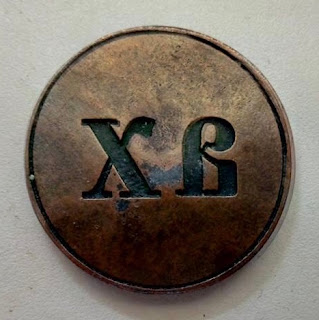What’s Your Imprint?
Scripture:
Jesus said to them, “Give to the emperor the things that are the emperor’s, and to God the things that are God’s.” And they were utterly amazed at him.
(Mark 12:17 NRSV)
Observation:
Hoping to trap Jesus, the religious leaders decide to ask him a question about taxation. Mark specifically places this story immediately following the parable of the vineyard. That parable is about robbing the Master. Therefore, this section is not so much about state - church separation or relationships, but that the religious leaders failed to realize the imprint of God was supposed to be stamped on their lives.
The Greek word for image is eikon, so, when Jesus asks about the eikon on the coin their response is very clear: Caesar. Brower tells us, “The NT uses the expression positively to describe Christ as the visible expression of God (2 Cor 3:18; 4:4; Col 1:15; 3:10), to which believers are to be conformed. Strictly speaking, the image on the coin was blasphemous.” (NBBC) Tertullian put it this way, “That means render the image of Caesar, which is on the coin, to Caesar, and the image of God, which is imprinted on the person, to God. You give to Caesar only money. But to God, give yourself.” (ON IDOLATRY)
Application:
Augustine says that we are to be God’s coins:
We are God’s money. But we are like coins that have wandered away from the treasury. What was once stamped upon us has been worn down by our wandering. The One who restamps his image upon us is the One who first formed us. He himself seeks his own coin, as Caesar sought his coin. It is in this sense that he says, “Render to Caesar the things that are Caesar’s, and to God the things that are God’s,” to Caesar his coins, to God your very selves. TRACTATE ON JOHN 40.9.
The whole statement places a limit on the authority which is found in Caesar, or the state. Earthly items, such as coins, belong to the earthly kingdoms, but humans, who are stamped with the image of the Creator belong to the Creator.
When earthly kingdoms ask us to give to them the things of God, we find ourselves in a difficult place. The Christians in Rome would have been in Mark’s mind as he placed this story within the text. When Caesar asked the early Christians to give him what belonged to God, they could not, and therefore they suffered. They would not align themselves with the empire. They understood that when the people of God give to Caesar what belongs to God alone, the prophetic voice becomes silenced.
If our life were to be examined, what would be the imprint? Would Christ be truly visible? We have the choice, either the world, or Jesus.
Prayer:
Lord, may your imprint be clear in my life. Amen.

Comments
Post a Comment